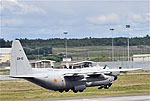Belgian Air Component participates in first Red Flag-Alaska
 JOINT BASE ELMENDORF-RICHARDSON, Alaska -- Twenty-seven members from the Belgian Air Component (BAC) 15th Air Transport Wing 20th Squadron made history this year by participating in their first Red Flag-Alaska (RF-Alaska) exercise.
JOINT BASE ELMENDORF-RICHARDSON, Alaska -- Twenty-seven members from the Belgian Air Component (BAC) 15th Air Transport Wing 20th Squadron made history this year by participating in their first Red Flag-Alaska (RF-Alaska) exercise.
The BAC arrived here June 8, with two C-130 Hercules, and will be participating until June 25, when the exercise ends.
RF-Alaska is a Pacific Air Forces-directed field training exercise for the U.S. and coalition forces flown under simulated air combat conditions. It is conducted on the Joint Pacific Alaskan Range Complex (JPARC), the largest air-ground training complex in the United States.
The JPARC is one of the major reasons the BAC is taking part in this exercise. They don't have the vast amount of space in Belgium to train as much. Here they are able to expand on their training while working with their coalition partners.
BAC Lt. Teodor Speda said exercises like this are helpful because they have a bigger playground to train and improve mission capabilities. Those participating in RF-Alaska have more than 67,000 square miles to conduct training scenarios.
Lieutenant Speda said there were some bumps in the road when they first arrived because the terrain presented a challenge. Once the BAC pilots were able to get a feel for it, however, the operations began moving smoothly.
"The main goal is to fly with our coalition partners and to integrate tactics and the way we operate with them just like we would do in real world as well," said BAC Maj. Kurt Deprez.
By taking part in this exercise, the BAC members were able to complete training exercises like low-level flying, air-land operations, air drops and assault landings -- some of which can't be performed in Belgium.
Major Deprez said he feels this training has been valuable because of the terrain. The terrain here is much like that in Afghanistan, where the BAC provides support to coalition forces by transporting troops and cargo, he said.
Along with the BAC, other aircrews are also subjected to every conceivable combat threat. Scenarios are shaped to meet each exercise's specific training objectives. All units are involved in the development of exercise training objectives.
Aircrews, however, aren't the only ones who benefit from the RF-Alaska exercise. Exercises provide an operations-training environment for participants such as unit-level intelligence experts, maintenance crews, and command and control elements.
Lieutenant Speda agreed that this training has been beneficial not only for the pilots but for his maintenance crew as well. Since this is treated as a combat scenario, when his crew encounters a problem with their aircraft, they need to solve it to their best of their ability, in a timely manner.
With everything going as smoothly as it can right now, Major Deprez said he feels this has been a very successful training exercise. He added that, if given the chance, they would participate again.